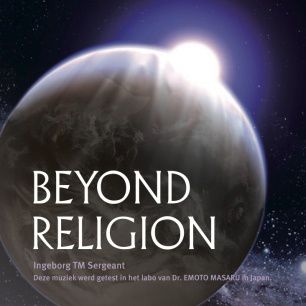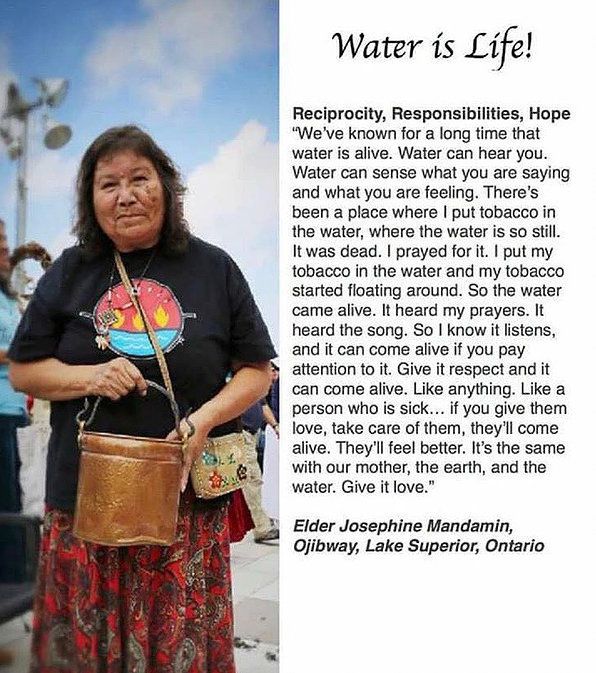Extrait d'un mail reçu cette semaine (octobre 2014)
~~Et voila le pourquoi de mon mail: après de multiples échanges et soins et discussions diverses, Patricia m'a donné un message pour toi que je lui ai promis de te communiquer. Je ne vais pas reprendre ici tous les détails mais en tout cas, elle a salué ton courage et le travail que tu fais et qui te prend tant à coeur au niveau de l'Eau. Ce travail est important, fondamental et fait partie des responsabilités des femmes et pour qu'il puisse s'accomplir avec encore plus de force, elle m'a chargée puisque je recevais la chanson sacrée de l'eau de te la transmettre aussi en personne. Voila en résumé. Je ne sais évidement comment faire car cela ne doit pas se faire via le net ... Annick
28/06/2013 :
Bonjour à tous et à toutes,
juste une petite demande particulière.
Mais importante ...
Je vous ai enseigné le chant sacré du Nibiwabo, qui est un chant Algonquin (Annishnabe).
Hier soir, j'ai reçu un appel du Canada, d'une des 13 Grands-Mères qui sont à la source du don de ce chant sacré, Grand-Mère Patricia, qui en reste la garante, avec une autre Grand-Mère, et qui s'est adressée d'abord à Aigle Bleu ... Ayant ainsi obtenu mon téléphone, elle m'a appelée pour me donner quelques précisions importantes.
Ce chant ne doit pas être modifié, et certaines consignes doivent absolument être respectées.
Les Grands-Mères choisissent à qui elles transmettent ce chant, et la cérémonie qui l'accompagne.
Or, il s'avère que la version qui m'a été enseignée n'est pas correcte, comme ne sont pas correctes la plupart des versions qui circulent en Europe. Comme elle apprécie mon engagement pour l'eau, elle me l'a chantée au téléphone, afin que je puisse l'enseigner maintenant dans sa version originale, et m'a autorisée à continuer de pratiquer cette cérémonie.
Quant aux explications que j'avais publiées, et aux paroles ... Même si les explications étaient correctes, elles ont été retraduites ... nous avons donc décidé ensemble qu'il vaut mieux tout effacer et recommencer à zéro. D'ici peu, je recevrai un texte de sa part, en français, que je serai autorisée à publier pour votre information.
Ainsi tout sera juste !
Le Nibiwabo est un chant Annishnabe, qui doit être respecté dans sa version originale. Le Dr Masaru Emoto a pu en apprécier l'effet par ses photographies.
En attendant que je reçoive les indications de la Grand-Mère, je vous demande de bien vouloir ne plus chanter le Nibiwabo, afin de ne pas attirer l'effet contraire, involontairement.
Si vous avez publié quoi que ce soit au sujet de ce chant, je vous demande de bien vouloir le retirer.
Et surtout de ne jamais le transmettre ni le publier sur internet, en particulier les vidéos qui sont faites parfois lors de stages, cercles de femmes ou évènements chamaniques.
Le chant devra être enseigné de bouche de femme à oreille de femme.
Ce faisant, nous montrons au peuple Annishnabe, et en particuliers aux Grands-Mères, que nous sommes respectueux de leur héritage.
Et moi, je vous remercie !
All my relations,
Amour et gratitude,
Minthé
.......
Extrait de : http://zhaawanart.blogspot.fr/2011/11/reflection-of-great-lakes-part-1.html
==Nibi Waaboo, the Water Song==
Nibi Waboo, le Chant de l’Eau
According to tradition, the nii`inaa ikwewag (women of the Anishinaabe Nation) are the keepers of Gichi-Nibi, the sacred water circle. The idea behind this is that Anishinaabekweg are more in tune with the natural cycles than ininwag (men). After all, it is the women in their period who are connected with the blood of the Earth, which is the water. Thus, Anishinaabekweg have the connection and the ways and the ceremonies to bless and purify the waters.
Selon la tradition, les nii`inaa ikwewag (les femmes de la Nation Anishinabee) sont les gardiennes de Gichi-Nibi, le cercle sacré de l’eau. La raison pour cela est que les Anishinaabekweg sont plus reliées aux cycles naturels que les ininwag (les hommes) . D’ailleurs, ce sont les femmes qui, pendant leurs lunes, sont connectées au sang de la Terre, qui est l’eau. Ainsi, les Anishinaabekweg ont la connexion et les façons de faire les cérémonies pour bénir et purifier les eaux.
An important part of the ancient water ceremony is called "MIDE WAABOO". In this ceremony, during which a song is sung called NIBI WAABOO or WATER SONG, a Midewikwe (a member of the medicinal, spiritual, scientifical, philosophical, and artistic society of the Anishinaabe Peoples, the MIDEWIWIN) holds the water up in a vessel made of the sacred copper, while the water song is sung by the other women attending.
Une partie importante de l’ ancienne cérémonie de l’eau est appelée «MIDE WAABOO». Dans cette cérémonie durant laquelle est chanté le chant qui s’appelle NIBI WABOO ou LE CHANT DE L’EAU, une Midewikwe (une membre de la société médicale, spirituelle, philosophique et artistique du peuple Anishinaabe, la MIDEWIWIN) porte l’eau au-dessus d’elle dans un récipient fait de cuivre sacré alors que le chant de l’eau est chanté par les autres femmes présentes.
The spirit of water is addressed to in prayer and a small amount of nibi is shared with everyone attending the ceremony. The water is no longer just nibi – it is then perceived as MIDE-WAABOO: sacred medicine water.
L’esprit de l’eau est appelé lors d’une prière et un petit peu de cette eau (nibi) est partagée avec toutes les personnes présentes à la cérémonie. L’eau n’est plus simplement « nibi » - elle devient alors MIDE-WAABOO, l’eau médecine sacrée.
The water songs can be sung at each new moon or even every day to bless the spirit of the water. This can be at the lake shores and at river banks, at wells and the great ocean - even at the sink in your kitchen: anywhere where there's water present. Traditionally, during the NIBI WAABOO performance, a ceremonial staff is being used and certain teachings are being shared. Women in a circle play clapper sticks of white birch bark - as it was done in the old days, before the hand drum came to women.
Les chants de l’eau peuvent être chantés à chaque nouvelle lune ou tous les jours pour bénir l’esprit de l’eau. Ceci peut se faire au bord des lacs, des rivières, des puits et du grand océan- même à l’évier de la cuisine. Partout où il y a de l’eau. Traditionnellement, lors du déroulement du NIBI WABOO, une tenue et des objets cérémoniels sont utilisés et certains enseignements sont partagés. Les femmes en cercle utilisent un bâton qu’elles tapent sur un autre bâton creux fait d’écorce de bouleau- tel que cela se faisait dans les temps anciens, avant que le tambour arrive aux femmes.
After a period of one hundred and fifty years in which the NIBI WAABOO had gone underground - and perhaps not been performed at all -, a group of women from the Omàmiwininiwak or Algonquin First Nation in Quebec decided to revitalize the NIBI WAABOO. Among the participants of the ceremony, which took place in February 2002 in Kitigan‑zibi reserve, were Omàmiwinini (Algonquin) women and women of mixed blood, thirteen in total. These thirteen women represented all women of all four races of the world.
Après une période de 150 ans pendant laquelle le NIBI WABOO a disparu de la surface de la terre et n’a peut-être plus du tout été chanté, un groupe de femme de Omàmiwininiwak ou Nation Première Algonquine du Québec, décida de rendre vie au NIBI WABOO. Parmi les participantes à cette cérémonie qui se passa en février 2002 dans la réserve de Kitigan-zibi, il y avait des femmes Omàmiwinini (Algonquine) et des femmes de sang mélangé, 13 en tout. Ces 13 femmes représentent les femmes de toutes les races du monde.
One of the women was a grandmother who in 1998 had received a vision of the ancient Nibi Waaboo. After having followed a four year-lasting spiritual journey in order to bring the rebirth of the ceremony to completion, she decided to remain anonymous. Since then the other twelve participants are the guardians of the ceremony, charged with passing on the ceremony to all the women of the world.
Une des femmes était une grand-mère qui, en 1998, avait reçu la vision de l’ancient NIBI WABOO. Après avoir effectué un voyage spirituel de 4 ans dans le but d’apporter la renaissance et la manifestation de la cérémonie, elle décida de rester anonyme. Depuis cet instant, les autres 12 participantes sont les gardiennes de la cérémonie avec comme mission de transmettre cette cérémonie aux femmes du monde entier.
The MIDE WAABOO is particularly held each year at the thirteenth moon - which is the moon at the end of February/March. It is established that the water song, like all women's ceremonies, shall be sung at the new moon and only by women. It is to be sung one time for each of the seven directions - east, south, west, north, the skies, the earth, and within oneself. According to the vision of the Omàmiwinini grandmother that led to the renewed water song ceremony, thirteen grandmothers stood on the ice of a lake in order to absorb the teachings from the water under their feet.
La MIDE WABOO est célébrée chaque année à la 13ème lune qui est celle de fin février/mars. Il est demandé que le chant de l’eau, comme toutes les cérémonies de femmes, soient chanté à la nouvelle lune uniquement par des femmes. Il faut le chanter une fois dans chacune des 7 directions – l’est, le sud, l’ouest, le nord, les cieux, la terre et pour soi-même. Selon la vision de la grand-mère « Omàmiwinin qui a permis la renaissance de cette cérémonie de l’eau, les 13 grand-mères se sont tenues debout sur un lac gelé afin de recevoir l’enseignement de l’eau par leurs pieds.
So sacred are the words that make up the nibi waaboo song, that - although it is deemed very important that the song is being shared throughout the world - they are supposed not to be shared through the Internet. Therefore we will not reveal the words of the song on our blog.*
Les mots qui constituent le chant du NIBI WABOO sont tellement sacré que, même s’il est plus qu’important que ce chant soit partagé à travers la terre entière, ils ne sont pas supposé être partagés sur internet. C’est pour cela que nous n’allons pas révéler les paroles de ce chant sur notre blog http://zhaawanart.blogspot.ch/2011/11/reflection-of-great-lakes-part-1.html
……………..
Il existe une version plus récente d’un chant de l’eau relayé par Menasekwe( Béatrice Johnson) de Obijew Migizi doodem. Ce chant, Nibi Nagamowin, a été écrit par Waabanikwe (Doreen Day) de Objiwe Waabizeshi doodem à la demande de son petit-fils. Ce chant est comme une berceuse sans percussions ou tambour. Les paroles de Nibi Nagamowin peuvent être partagées librement.
Traduction de textes dans la vidéo :
« L’eau est malade…. Et les gens doivent vraiment se battre pour cette eau, parler pour cette eau, aimer cette eau » Josephin Mandamin, Mother Earth Water Walk.
Doreen et son petit-fils Mashkoonce, ont donné la permission de partagé ce chant à chacun…chantez le chaque jour à l’eau.
Ne-be Gee Zah-gy-e-goo Water we love you Eau nous t’aimons
Gee Me-gwetch- wayn ne-me-goo Thank you Nous te remercions
Gee Zah Wayn ne-me-goo Respect you Nous te respectons
Traduction par Claire-Lise



/https%3A%2F%2Fi.vimeocdn.com%2Fvideo%2F704836376.jpg%3Fmw%3D1920%26mh%3D1080%26q%3D70)
/http%3A%2F%2Fwww.motherearthwaterwalk.com%2Fwp-content%2Fuploads%2F2014%2F05%2Fwaub-150x150.jpg)
/https%3A%2F%2Fstatic1.squarespace.com%2Fstatic%2F5b0eef6c31d4df963214f4a8%2Ft%2F5b157a4588251bbf1685a454%2F1528134230086%2FHN_IMG_4281R_Gma_teach.jpg)


/https%3A%2F%2Fi.ytimg.com%2Fvi%2FMta0Oh02J-M%2Fhqdefault.jpg)




/image%2F0570028%2F20210812%2Fob_914d5c_lachamanedeleau-pro3d.png)